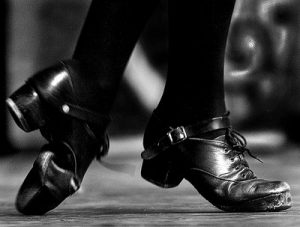As a baby, I never crawled. I walked at eight months of age with nothing between lying on my stomach and cruising around on two legs. My mother had read that skipping the crawling phase led to a lack of motor skills as an adult, so she enrolled me in every dance class on the planet to compensate for my alleged motor development loss. The result? I can dance like nobody’s business in just about any style. I can shuffle off to buffalo in my tap shoes, I can do fouettes in my pointe shoes, and I can do a hornpipe in my Irish hard shoes. I can also bang my toes and knees into things that I swear don’t even exist until I trip over them. The best laid plans, right? I’m a klutz. Sorry, mom. You tried.
I’m also fairly musical. I can play piano, flute, and clarinet, and I am (or was; I haven’t tried any of those things in over a decade) very good at them. I quit because I never loved making music; I like moving to it.
My big weakness in both dance and music is embarrassing and frustrating. I can’t improvise. Not on any instrument and not in any pair of dance shoes. Dancing is a lifelong passion for me, and I’ve spent countless hours to become quite good at it. Yet, if you take me to a club where people are just moving to the beat with no choreography, I’m a mess. I jerk around like a ferret on amphetamines and I’m sort of scared that a good Samaritan might think that I’m having a seizure and act accordingly.
As a pianist in high school, I played competitively and performed a Chopin nocturne at my high school graduation. During my senior year, I auditioned to play the piano for Godspell for my high school’s drama club. I was doing great until the director asked me to transpose the piece up half an octave and add some flair. I froze. Transpose? Flair? I don’t think so. I stared at the keys and apologized until the director took some pity on me and told me not to worry about it.
The point is that I, like most people with autism, am very formulaic. I’m very technical. I can follow directions (even the ones from Ikea, but please don’t hate me for that), but I simply cannot make my own way. I need to be told what to do. That is not necessarily a bad thing! As a lawyer, I’ve often found it to be my saving grace. I know how things are supposed to go and I’m determined to get them there. I imagine that things are much the same in the medical profession; I mean, everyone loves House, but no one actually wants a doctor who doesn’t play by the rules. If you’re doing open heart surgery on me, please just do things the way you’ve been taught, OK? In the real world, improvisation is not necessarily as exciting or progressive as it seems on TV. It’s the people who follow what they’ve learned, whether it’s in a courtroom or an operating room, who can be trusted. I truly believe that. Innovators might make history, but the people who follow time-tested formulas are indispensable. I’m never going to win a Nobel Prize for drafting a meticulous estate plan. I probably won’t even get a Wikipedia entry. But for my clients, my ability to follow the rules is what’s most important. For people with autism, following the rules is comforting, and it can be a burden or an asset. Finding how to make what my mom calls “rigidity of thinking” (I think she read that in a book somewhere) into a strength can be a challenge, but it’s not an insurmountable one.
I know the rules. I follow the rules. Professional life and the rules fit together in a duet that’s both logical and satisfying. No one should feel ashamed about not being able to come up with new dance steps, musical tunes, or ideas on the spot. I think a lot of people with ASD feel acutely that the inability to improvise is a failing. It’s not. If you use that alleged weakness properly, it can be a real benefit.
To summarize: The ability to improvise in any venue is admirable, if a bit overrated, but just flat-out unattainable for some people, particularly people with ASDs, and that’s okay. How boring would life be if everyone had the same skill set? And in case you’re wondering, no, I did not get to play the piano for Godspell. And I was quite relieved.


